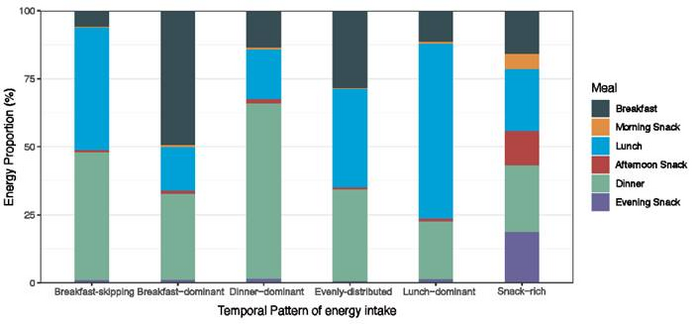Globally, there are approximately 55 million people who suffer from dementia, and the incidence of the disease has steadily increased. The number of the population is expected to triple by 2050, particularly in low- and middle-income countries. Dementia affects not only the quality of life of individuals, but also adds significant economic burdens to families and society.

Credit: Hui Chen, Yang Tao, Min-Dian Li, Yuxuan Gu, Jiaxi Yang, You Wu, Dongmei Yu, Changzheng Yuan
Globally, there are approximately 55 million people who suffer from dementia, and the incidence of the disease has steadily increased. The number of the population is expected to triple by 2050, particularly in low- and middle-income countries. Dementia affects not only the quality of life of individuals, but also adds significant economic burdens to families and society.
Epidemiological studies have shown a correlation between the temporal distribution of energy intake during a day (TPEI) and the risk of various chronic diseases such as diabetes and hypertension. However, evidence regarding the relationship between TPEI and cognitive function at the population level is relatively lacking.
Previous studies in animal models have shown that the disruption in meal timing can cause alterations in clock rhythms in the hippocampus, thereby affecting cognitive function. According to a short-term intervention trial of 96 young adults, dividing equal amounts of food into four meals between 9 am and 3 pm could improve cognitive function compared to eating twice between 9 am and 3 pm. However, long-term study is lacking about the TPEIs and cognitive function.
Recently, Drs Changzheng Yuan and Dongmei Yu at Zhejiang University published a paper in Life Metabolism entitled “Temporal patterns of energy intake and cognitive function and its decline: a community-based cohort study in China” Based on the China Nutrition Health Survery (CHNS) public database, a total of 3,342 participants were included in this study, who were middle-aged and older adults (mean age 62 years) from nine provinces in China with a baseline age ≥ 55 years.
The researchers used: 1) A data-driven k-means algorithm to identify six patterns of TPEIs, including “evenly-distributed” pattern, “breakfast-dominant” pattern, “lunch-dominant” pattern, “dinner-dominant” pattern, “snack-rich” pattern, and “breakfast-skipping” pattern; 2) Cognitive function was assessed using the modified Telephone Interview for Cognitive Status (TICS-m), comprising immediate and delayed word recalls (20 points), backward counting (2 points), and serial-7 subtraction test (5 points). The total global cognitive score ranged from 0 to 27, with a higher score representing a better cognitive function; 3) The correlation of TPEIs to cognitive function over 10 years was assessed using linear mixed models (LMMs), which was adjusted for age, gender, residence, total energy, physical activity, smoking status, alcohol consumption, household income, education level, and body mass index (BMI).
The result showed that, compared with those with “evenly-distributed” pattern, the long-term cognitive function scores were significantly lower in those who had unbalanced TPEIs, especially those with “breakfast-skipping” pattern. Thus, maintaining balanced TPEIs has potentially positive effects on cognitive health, whereas skipping breakfast may significantly increase the risk of cognitive decline in middle-aged and older adults. In conclusion, this study highlights the importance of optimal TPEIs in cognitive function.
###
About Higher Education Press
Founded in May 1954, Higher Education Press Limited Company (HEP), affiliated with the Ministry of Education, is one of the earliest institutions committed to educational publishing after the establishment of P. R. China in 1949. After striving for six decades, HEP has developed into a major comprehensive publisher, with products in various forms and at different levels. Both for import and export, HEP has been striving to fill in the gap of domestic and foreign markets and meet the demand of global customers by collaborating with more than 200 partners throughout the world and selling products and services in 32 languages globally. Now, HEP ranks among China’s top publishers in terms of copyright export volume and the world’s top 50 largest publishing enterprises in terms of comprehensive strength.
About Life Metabolism
Life Metabolism is a fully open access, peer-reviewed journal that publishes one volume per year online, providing a platform for the publication of works of high significance and broad interest in all areas of metabolism. Life Metabolism welcomes several different article types, including original article, review article, research highlight, letter, editorial, perspective, and so on. Once a paper is accepted, Life Metabolism can publish a precopyedited, preproofed version of the paper online within 48 hours of receiving a signed licence, and this will be replaced by a copyedited, proofed version of the paper as soon as it is ready. The Editors-in-Chief are professors Peng Li at Tsinghua University and John R Speakman at University of Aberdeen, UK. In the first three years, there will be no publication costs for publishing in Life Metabolism, and Open Access fees will be waived.
Journal
Life Metabolism
DOI
10.1093/lifemeta/loac011
Method of Research
Survey
Subject of Research
People
Article Title
Temporal patterns of energy intake and cognitive function and its decline: a community-based cohort study in China
Article Publication Date
7-Jul-2022




